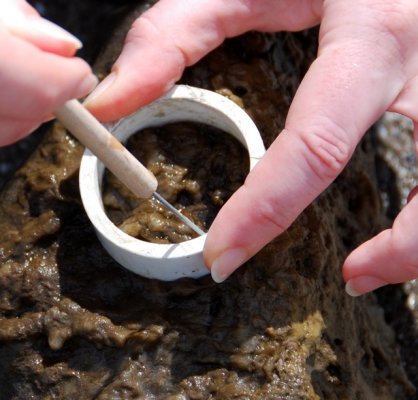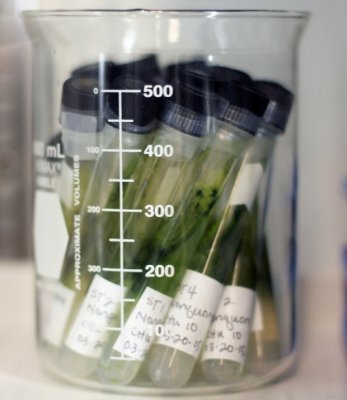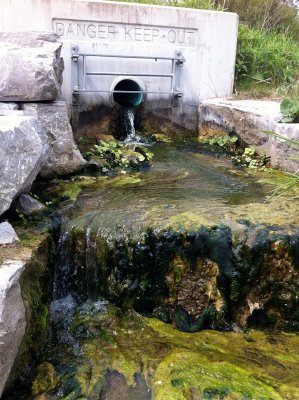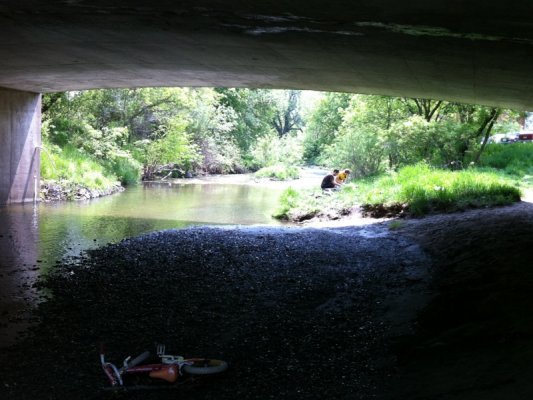Media
Publications:
Documents:
Videos:
Audio/Podcasts:
Biography
Andrea Kirkwood, PhD, knows exactly what’s in the water of our rivers, lakes and streams. An aquatic microbial biologist, she has dedicated her life’s work to the understanding and preservation of ecological systems, in addition to harnessing biotechnology from aquatic microorganisms.
An inherent curiosity about the world around her and deeper concern for the sustainable health of the environment guided Dr. Kirkwood’s education. In 1994, she completed a Bachelor of Environmental Studies (Joint Honours) degree in Environment and Resource Studies and Biology (Co-op), which she received from the University of Waterloo, Ontario. In 1996, she earned her Master of Science degree in Aquatic Ecology at McMaster University, Hamilton, Ontario, where she fell in love with research and the freedom to explore both in the field and the lab. In 2003, Dr. Kirkwood obtained her Doctorate in Environmental Microbiology from the University of Toronto (U of T), Ontario.
Since joining the University of Ontario Institute of Technology (now known as Ontario Tech University) in 2008, Dr. Kirkwood has been instrumental in developing a state-of-the-art Aquatics Lab. She has worked to strengthen the university’s Science programs and she has helped bring a Doctorate of Philosophy in Applied Bioscience degree to the university.
Dr. Kirkwood achieved the rank of full Professor in 2022, the first woman in the Faculty of Science at Ontario Tech University to achieve this career milestone.
Industry Expertise (7)
Biotechnology
Education/Learning
Environmental Services
Fishery and Aquaculture
Laboratory Services
Renewables and Environmental
Research
Areas of Expertise (13)
Algae
Algal Blooms
Aquatic Ecology
Aquatic Invasive Species
Biofuels and Combustion Emissions
blue-green algae
environmental microbiology
Great Lakes
Lake Ecosystems
river ecosystems
Pollution
Urban Ecosystems
Water Quality
Accomplishments (4)
Board of Directors, Friends of Second Marsh (professional)
2012-01-01
Since 2012, Dr. Kirkwood has been a member of the Board of Directors of Friends of Second Marsh, a not-for-profit charitable organization dedicated to encouraging the protection and appreciation of Second Marsh, a coastal wetland located in Durham Region, other Great Lakes wetlands, our natural heritage system, and to promoting a healthy environment through education, communication, developing partnerships and fostering connections with all sectors of the community.
Scientific Advisory Board, Canadian Phycological Culture Centre (professional)
2014-04-30
The Canadian Phycological Culture Centre (CPCC) provides research quality cultures, culture medium, and other related services to educational institutions, government and commercial laboratories worldwide. Housed at the University of Waterloo in the Department of Biology, the CPCC is internationally recognized as a major service collection of living freshwater algal, cyanobacterial and Lemna spp. (duckweed) cultures.
Post-doctoral Fellow, University of Calgary (professional)
2005-01-01
Dr. Kirkwood completed her post-doc work and continued as a research associate supported by grants from the Alberta Conservation Association and Alberta Sustainable Resource Development.
Post-doctoral Fellow, Oklahoma State University (professional)
2002-09-01
During her two-year post-doctoral fellowship, Dr. Kirkwood studied algal extremophiles at the Salt Plains Microbial Observatory.
Education (3)
University of Toronto: PhD, Environmental Microbiology 2003
McMaster University: Master of Science, Aquatic Ecology 1996
University of Waterloo: Bachelor in Environmental Science, Environment and Resource Studies and Biology 1994
Joint Honours (Co-op)
Affiliations (12)
- American Society of Limnology and Oceanography
- Canadian Society for Ecology and Evolution
- Canadian Society of Microbiologists
- Ecological Society of America
- Global Lake Ecological Observatory Network
- North American Lake Management Society
- Phycological Society of America
- Society of Freshwater Sciences
- Society of Canadian Limnologists
- Friends of Second Marsh
- Canadian Phycological Culture Collection
- University of Toronto
Links (3)
Media Appearances (8)
Study looks to protect Oshawa’s waterways as city continues to grow
The Oshawa Express print
2016-11-23
The city’s north end is booming, but with the construction and the urbanization comes the possibility for contamination. As for how badly Oshawa’s waterways are being impacted, the answer is yet to be determined. One thing is certain – as the development continues, the City of Oshawa will need to keep an eye on the quality of water in its creeks and streams if it wishes to save the beaches of Lake Ontario from consistent closures.
Scugog Lake Stewards launch research project to document aquatic plants in Lake Scugog
Port Perry Star print
2016-06-06
SCUGOG -- An ambitious plan to map and document the aquatic plants that live under the surface of Lake Scugog -- and sometimes float on it -- has set sail.
University of Ontario Institute of Technology biologist Andrea Kirkwood to advise on Great Lakes water quality
Oshawa This Week print
2016-03-29
DURHAM -- A University of Ontario Institute of Technology biologist will advise the International Joint Commission on the current quality of the water in the Great Lakes. Andrea Kirkwood, an associate professor at the UOIT faculty of science, will join the commission in Washington, D.C. for a semi-annual meeting this April.
UOIT Experts Are Tackling a Variety of Ecotoxicology Issues With Help From SOWC
Southern Ontario Water Consortium Newsletter online
2016-03-01
The University of Ontario Institute of Technology (UOIT) is small but mighty when it comes to its researchers studying a variety of areas within ecotoxicology.
UOIT biologist to advise IJC on Great Lakes water quality
UOIT News online
2016-03-28
For more than a century, the International Joint Commission (IJC) has been responsible for the stewardship of the many lake and river systems along Canada’s border with the United States. Now for the first time, the IJC will have a connection to University of Ontario Institute of Technology (UOIT).
Kirkwood Lab participates in largest crowd-sourced field study
UOIT News online
2016-01-05
A social media call for collaborators has a UOIT professor and her lab collaborating with over 170 researchers from more than 50 countries. Dr. Andrea Kirkwood, Associate Professor of Biology in the Faculty of Science, and researchers in the Kirkwood Lab are participating in the Cellulose Decomposition Experiment (CELLDEX), a global study conducted in the banks of streams and rivers across the globe. Spearheaded by Dr. Scott Tiegs, Associate Professor at Oakland University, the study uses cotton strips placed adjacent to streams to determine the decomposition rate across different biomes in the world and how environmental factors can influence them, including climate change. All ecosystems depend on decomposition to remove waste and recycle nutrients back into the ecosystem to sustain life, so the research provides an important baseline.
Women in Science Series: Meet Dr. Andrea Kirkwood
Canadian Science Publishing online
2014-07-02
Our interviewee is Dr. Andrea Kirkwood, an Associate Professor of Biology at the University of the Ontario Institute of Technology (UOIT) in Oshawa. Andrea has a BES in Environment & Resource Studies and Biology from the University of Waterloo, an MSc in Aquatic Ecology from McMaster, and a PhD in Environmental Microbiology from the University of Toronto.
Earth Day Oshawa Creek walk guided by UOIT professor
UOIT News online
2014-05-04
Nature lovers in Oshawa spent a cloudy Earth Day 2012 taking an informative guided walk along Oshawa Creek. Hosted by the City of Oshawa, the creek walk was led by UOIT biology professor Dr. Andrea Kirkwood. Attendees gathered at Oshawa City Hall to listen to the short presentation about urban creeks. Dr. Kirkwood explained what stresses can be placed on the creeks, why waterways are important to protect and how that goal can be achieved. Around 30 people attended the walk, which Dr. Kirkwood says was the perfect size as everyone was able to hear, see and learn along the way.
Event Appearances (9)
Determining the impact of cadaver decomposition on soil microbial communities
63rd Annual Conference of the Canadian Society of Microbiologists Ottawa, Ontario
2013-06-20
The role of Cladophora glomerata as a refuge for fecal and pathogenic bacteria in a near-shore region of Lake Ontario
2013 Annual Conference of the Canadian Society of Microbiologists: Environmental Dimension of Antibiotic Resistance Satellite Symposium Ottawa, Ontario
2013-06-16
Assessment of wastewater algae for use in biofuel production
BioFuelNet Annual General Meeting Montreal, Quebec
2013-06-12
Characterization of stormwater management ponds and their role as a land-water linkage in urban environments
Joint Meeting of the Society of Canadian Limnologists and Society of Wetland Scientists Waterloo, Ontario
2013-01-01
Characterization of urban stormwater ponds and their role as a cross-ecosystem linkage in urban environments
Society of Freshwater Science Louisville, Kentucky
2012-05-20
Diversity, function and resilience of microbial communities from urban wetlands
Canadian Society of Microbiologists Conference St. John's, Newfoundland
2011-06-20
The influence of shoreline development and geology on lake water quality in The Land Between Ecotone
Lake Simcoe Science Forum Barrie, Ontario
2011-05-26
Water quality characteristics of lakes in The Land Between
The Land Between Science and Stewardship Symposium Haliburton, Ontario
2010-10-15
The role of urban wetland community structure and function in contaminant fate
37th Annual Aquatic Toxicity Workshop Toronto, Ontario
2010-10-03
Articles (3)
Prevalence of Antibiotic Resistance Genes in Bacterial Communities Associated with Cladophora Glomerata Mats Along the Nearshore of Lake Ontario
Canadian Journal of Microbiology
2017-02-13
The alga Cladophora glomerata can erupt in nuisance blooms throughout the lower Great Lakes. Since bacterial abundance increases with the emergence and decay of Cladophora, we investigated the prevalence of antibiotic resistance (ABR) in Cladophora-associated bacterial communities up-gradient and down-gradient from a large sewage treatment plant (STP) on Lake Ontario. Although STPs are well-known sources of ABR, we also expected detectable ABR from up-gradient wetland communities, since they receive surface run-off from urban and agricultural sources.
Screening Microalgae Isolated from Urban Storm- and Wastewater Systems as Feedstock for Biofuel
PeerJ
2016-09-01
Exploiting microalgae as feedstock for biofuel production is a growing field of research and application, but there remain challenges related to industrial viability and economic sustainability. A solution to the water requirements of industrial-scale production is the use of wastewater as a growth medium. Considering the variable quality and contaminant loads of wastewater, algal feedstock would need to have broad tolerance and resilience to fluctuating wastewater conditions during growth.
The Impact of Carrion Decomposition on the Fatty Acid Methyl Ester (FAME) profiles of Soil Microbial communities in southern Canada
Canadian Society of Forensic Science Journal
2015-11-17
Profiling microbial communities associated with cadaver decomposition may provide useful information concerning post-mortem intervals and aid in the identification of clandestine graves. Four experiments using pig carcasses as human decomposition analogues were performed over the course of 2011 and 2012 in southern Ontario to document changes in soil microbiology following decomposition.










Social